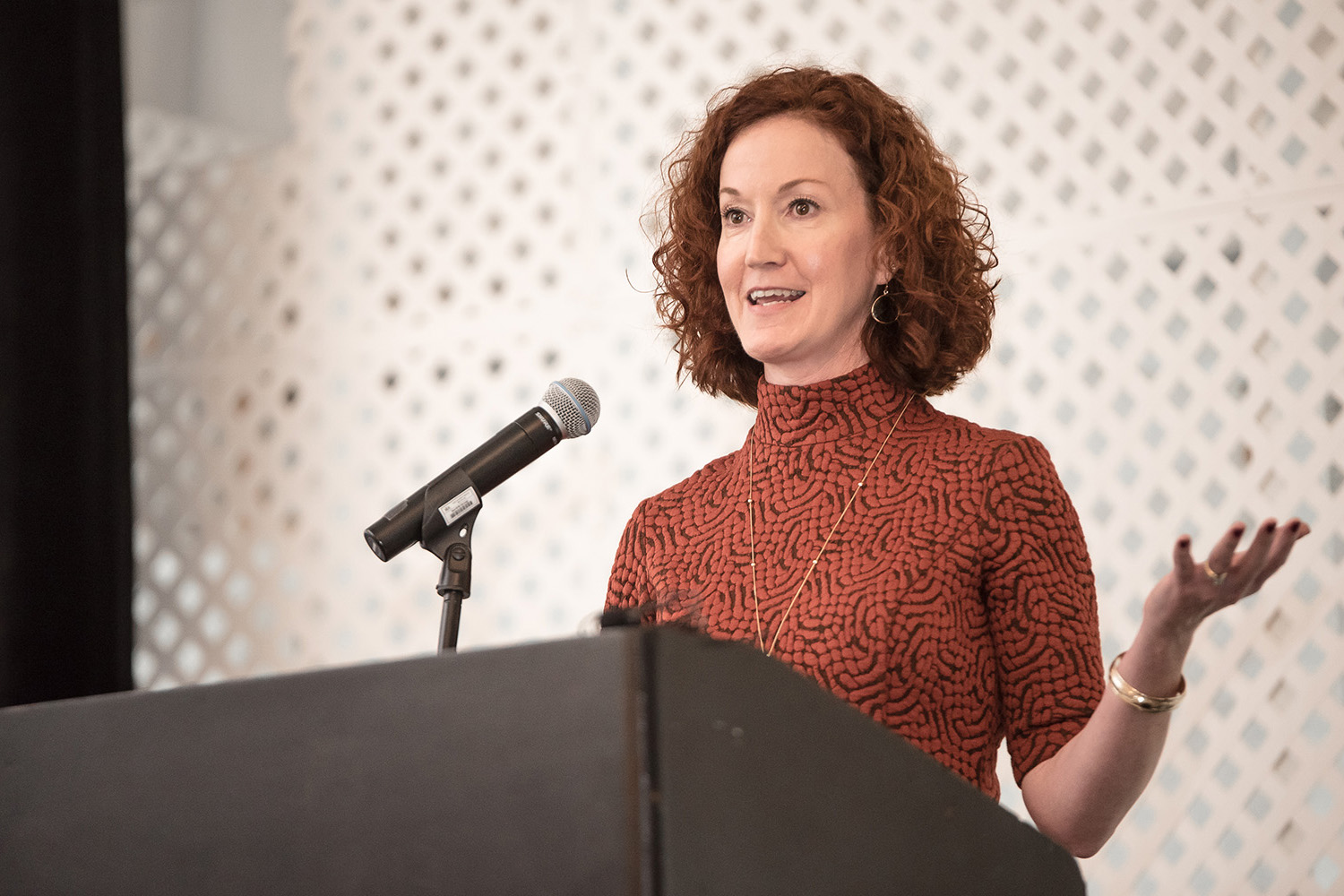School of Business Lead Education Sponsor for National Association of Women MBAs Conference
The path to a top executive position isn’t a straight line, but, instead, a series of zig-zags that build competence, expertise and wisdom.
That’s what Melissa B. Cummings ’98 MBA, senior vice president and chief customer officer at Blue Cross Blue Shield of Rhode Island, told hundreds of women MBA students and graduates.
She was the keynote speaker at the National Association of Women MBAs conference held in Stamford, Conn., in October. UConn was the lead education sponsor for the program titled, “Connect with Confidence.”
Cummings said over the course of her career, she took many risks that sometimes made her stomach hurt, but propelled her down an unexpected and much-enjoyed path, she said.
“Taking no risk is actually more risky,” she said. “Choices and the ability to decide is a powerful tool. If you don’t try new things, you get stagnant and you get bored… Those twists and turns have shaped my personal and professional life.”
“Do the thing that scares you. The things I choose to do give me a stomach ache sometimes. But they’ve stretched me to do something I didn’t think I could do,” she said. “And the result is personal growth.”
In her remarks, Cummings paid particular attention to the many young women women starting, or redirecting, their careers. She said not to be reluctant to ask people for a recommendation or an introduction.
“No one says, ‘No!’ if you reach out and say, ‘Can you tell me how you got started in business?,'” she said. However, it is a two-way street. If someone helps you in your career, you must, in turn, help someone else.
Find your “personal board of directors,” a trusted and nurturing group of business mentors and advisers, she recommended. Cummings said her network includes three people: one who is financial savvy; another who is a strategic genius and a third who is a ‘people person.’ It takes effort and focus to find these valuable relationships, she said. Don’t forget to nurture them once you’ve found them, she added.
Work with someone you admire and respect, and learn from her. “Seek leaders whose goals align with yours,” she said. “Find the right culture. So many companies are doing important work, but not all of them might be right for you.”
If you’re not happy in your current department, consider seeking another job within the organization, she said. Many of the 25 women who lead Fortune 500 companies stayed within the same company and took on new challenges. “Sometimes moving sideways can be just as important as moving up,” she said.
Being a subject-matter expert isn’t always vital, Cummings said. She isn’t an insurance underwriter, but when she talks to underwriters about products, services and competition, she tries to add value by thinking more broadly and employing general management expertise.
“My job is to ask questions, look for patterns, motivate teams and execute plans,” she said.
Embrace the customer in everything you do. Cummings requested the title of chief customer officer and said it sent a signal to the organization that customer service is a key part of the work they do.
“In most businesses the reality is that we often get lost in our own work and lose sight of what we need to do…. You need to think about the customer when you design a bill, create a web site or offer a product,” she said. “Are you thinking about what’s easiest for you or what’s best for them?”
“Thinking about others isn’t limited to work or family. I work in a business where our customers are literally our neighbors,” she said. “When I started working at Blue Cross/Blue Shield, we went out and talked to our customers and our brokers and it was so enlightening. In my first exploratory meeting, there was a woman whom I went to high school with. Bring the voice of the customer into what you do every day.”
Strive for harmony, not a work-life balance, which is not achievable. “Harmony is what works for me. It might be different from what works for you. The ratio changes during your career. Taking a pause is OK,” she said. After her first daughter was born, she decided not to return to work, a decision that shocked everyone who knew her, including herself.
“I think women have the perception that taking a break—whether to raise a baby, care for a sick family member or take a sabbatical—ruins a career. But in my experience, it only adds to it,” she said.
After her oldest child turned one, Cigna, her then employer, called and asked her to return to work to head up a program. She said she would, if she could work part-time and company leadership agreed. “Sometimes we are afraid to ask for what we want,” she said.
Listen first, before you act. Whenever she starts a new job, Cummings said, she always meets with the employees, and generally they are shocked. “They’ll say, ‘No one has ever taken the time to ask me about me.’ We are nothing if we don’t foster these relationships.” Often it is the front-line employees who know the barriers to a company’s success, she said.
“At Blue Cross/Blue Shield, we hold monthly managers’ roundtables with no agenda. We talk about whatever is on our minds,” she said. “It helps us make decisions faster, better and operate differently.”




